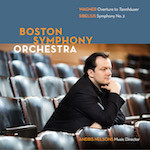|
Back
01/08/2015
Richard Wagner: Tannhäuser Overture
Jean Sibelius: Symphony No. 2 in D Major, Op. 43
Boston Symphony Orchestra, Andris Nelsons (conductor)
Recording: Symphony Hall, Boston, Massachusetts, USA (September and November 2014) – 61'12
BSO Classics 1401 – Booklet in English

   
Foregoing any unfamiliar repertoire or a starry soloist, Andris Nelsons' first recording as Music Director of the Boston Symphony Orchestra gives listeners an opportunity to gauge the Latvian conductor's interpretive approach and the BSO's current personnel. Entering a very crowded and competitive field, Nelsons' hyper-romantic readings of two warhorses are personal and reveal a true interpretive individuality that some will either intrigue or frustrate listeners.
Wagner's overture to Tannhäuser coaxes warm, glowing and powerful sonorities from the orchestra, and a steadily sculpted architectural arc from the podium. The various episodes of the work are beautifully played, and there is a perceptible sweep to the final climax. The string and woodwind repartee in the "Venusburg" music moves organically across sections. This perhaps lacks the fire and brimstone of Solti or Szell, instead opting for a solid, solemn overall feel.
In a brief salutation in the CD booklet, Nelsons mentions the BSO's great Sibelius legacy (Koussevitzky and Colin Davis). Nelsons adopts a bilateral approach to the piece, with quick music played urgently precise and slow music stretched, sometimes disfigured. The most clear juxtaposition of these two approaches is in the third movement. The tempestuous Vivacissimo is played with abandon and utmost, severe clarity, and is then interrupted by the oboe's plaintive trio, where the tenuto indications at the ends of phrases are taken to the extreme. Davis, in his benchmark Boston recording, and Szell in his equally fine Concertgebouw reading, are not wont to linger over such minutiae, allowing the organic inner pulse to always be felt. Nelsons' protractions verge on micro-management. This was also a characteristic of his Dvorák New World recording from Munich, and one hopes that idiosyncrasy for its own sake doesn't become his modus operandi.
The orchestra digs in to both works, and the balance from top to bottom is excellent. There is extra presence from low brass and woodwinds, giving the Sibelius an especially dark hue. The triumphant brass passages at the ends of both works are magnificently played and captured by the engineers.
Marc Mandel's smart program notes, which highlight important historical and musical aspects of both pieces, are some of the strongest I've come across in a long time. The recording's clarity and dynamic range are impressive and realistic, giving a true sense of the magnificent acoustics of Boston's legendary Symphony Hall. The BSO certainly has an intriguing musical personality at its helm, and its house label is offering excellent products. It will be interesting to see how the relationship between conductor and orchestra develops.
Marcus Karl Maroney
|